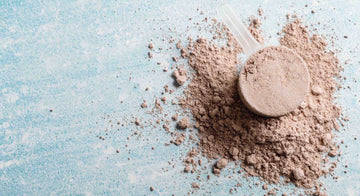The Ultimate Guide to Counting Calories and Macronutrients: Part 3: Maintaining Muscle Mass with Nutrition - Strategies to Keep Your Body in Optimal Condition
Welcome to the final post in our three-part blog series on nutrition and fitness. In part one, we focused on calorie counting and how it can be an effective tool for weight loss. In part two, we discussed macronutrients and how they can help you build muscle. In this final post, we will be exploring nutrition strategies to help you maintain your muscle mass.
If you're looking to maintain your muscle mass, there are a few things you need to consider. In addition to your training program, your diet plays a critical role in keeping your body in optimal condition. In this post, we will be discussing what you should be eating to maximize your muscle maintenance. We will also be examining the role of essential vitamins and minerals, as well as supplements you can take to enhance your muscle growth.
Eating Healthy Carbs for Energy and Recovery
One of the most important aspects of maintaining your muscle mass is ensuring that you have enough energy to fuel your workouts. While many people believe that carbohydrates are the enemy, they are actually an essential part of any athlete's diet. Carbohydrates provide your body with the energy it needs to perform at its best, and they are critical for recovery after exercise.
When it comes to carbohydrates, not all sources are created equal. You want to focus on complex carbohydrates such as whole grains, sweet potatoes, and legumes. These sources of carbohydrates are digested slowly, providing your body with sustained energy throughout the day. They also contain valuable nutrients such as fiber, vitamins, and minerals.
Understanding the Role of Essential Vitamins and Minerals in Muscle Maintenance
In addition to carbohydrates, essential vitamins and minerals play a critical role in muscle maintenance. It's important to remember that your body is a complex machine, and it requires a wide array of nutrients to function properly.
When it comes to muscle maintenance, there are a few key nutrients to focus on. These include:
Protein - Amino acids are the building blocks of muscle tissue, and protein is essential for repairing and maintaining muscle mass.
Vitamin D - This vitamin is critical for bone health, and it also plays a role in muscle function. Studies have shown that low levels of vitamin D are associated with a higher risk of muscle weakness and falls in older adults.
Calcium - Like vitamin D, calcium is essential for bone health. It also plays a role in muscle contraction and relaxation.
B Vitamins - These vitamins are important for energy production and can help reduce muscle fatigue.
Supplements to Enhance Muscle Growth
While a healthy diet is the foundation for maintaining your muscle mass, there are also supplements that can help enhance your results. Here are a few supplements to consider:
Creatine - This supplement has been shown to increase muscle mass and strength in some people.
Beta-alanine - Beta-alanine is an amino acid that can help improve your endurance and delay fatigue.
Whey protein - If you're struggling to get enough protein from your diet, whey protein can be a convenient and effective supplement.
It's important to remember that supplements are not a magic solution. They are simply a tool to help you reach your goals. It's essential to have a solid diet and exercise program in place before adding supplements to your regimen.
Conclusion:
Maintaining muscle mass is a critical component of any fitness program. In addition to regular exercise, your diet plays a critical role in keeping your body in optimal condition. By focusing on healthy carbohydrates, essential vitamins and minerals, and supplements to enhance muscle growth, you can maximize your muscle maintenance and achieve your fitness goals.
Remember, nutrition is not a one-size-fits-all solution. It's important to listen to your body and find what works best for you. If you're unsure about what changes to make to your diet, consult with a registered dietitian or certified fitness professional for personalized recommendations.
If you're looking to maintain your muscle mass, there are a few things you need to consider. In addition to your training program, your diet plays a critical role in keeping your body in optimal condition. In this post, we will be discussing what you should be eating to maximize your muscle maintenance. We will also be examining the role of essential vitamins and minerals, as well as supplements you can take to enhance your muscle growth.
Eating Healthy Carbs for Energy and Recovery
One of the most important aspects of maintaining your muscle mass is ensuring that you have enough energy to fuel your workouts. While many people believe that carbohydrates are the enemy, they are actually an essential part of any athlete's diet. Carbohydrates provide your body with the energy it needs to perform at its best, and they are critical for recovery after exercise.
When it comes to carbohydrates, not all sources are created equal. You want to focus on complex carbohydrates such as whole grains, sweet potatoes, and legumes. These sources of carbohydrates are digested slowly, providing your body with sustained energy throughout the day. They also contain valuable nutrients such as fiber, vitamins, and minerals.
Understanding the Role of Essential Vitamins and Minerals in Muscle Maintenance
In addition to carbohydrates, essential vitamins and minerals play a critical role in muscle maintenance. It's important to remember that your body is a complex machine, and it requires a wide array of nutrients to function properly.
When it comes to muscle maintenance, there are a few key nutrients to focus on. These include:
Protein - Amino acids are the building blocks of muscle tissue, and protein is essential for repairing and maintaining muscle mass.
Vitamin D - This vitamin is critical for bone health, and it also plays a role in muscle function. Studies have shown that low levels of vitamin D are associated with a higher risk of muscle weakness and falls in older adults.
Calcium - Like vitamin D, calcium is essential for bone health. It also plays a role in muscle contraction and relaxation.
B Vitamins - These vitamins are important for energy production and can help reduce muscle fatigue.
Supplements to Enhance Muscle Growth
While a healthy diet is the foundation for maintaining your muscle mass, there are also supplements that can help enhance your results. Here are a few supplements to consider:
Creatine - This supplement has been shown to increase muscle mass and strength in some people.
Beta-alanine - Beta-alanine is an amino acid that can help improve your endurance and delay fatigue.
Whey protein - If you're struggling to get enough protein from your diet, whey protein can be a convenient and effective supplement.
It's important to remember that supplements are not a magic solution. They are simply a tool to help you reach your goals. It's essential to have a solid diet and exercise program in place before adding supplements to your regimen.
Conclusion:
Maintaining muscle mass is a critical component of any fitness program. In addition to regular exercise, your diet plays a critical role in keeping your body in optimal condition. By focusing on healthy carbohydrates, essential vitamins and minerals, and supplements to enhance muscle growth, you can maximize your muscle maintenance and achieve your fitness goals.
Remember, nutrition is not a one-size-fits-all solution. It's important to listen to your body and find what works best for you. If you're unsure about what changes to make to your diet, consult with a registered dietitian or certified fitness professional for personalized recommendations.
Comments
No comments
Leave a comment
Your Email Address Will Not Be Published. Required Fields Are Marked *

Subscribe
Subscribe to our newsletter and receive a selection of cool articles every weeks
Related articles







comments